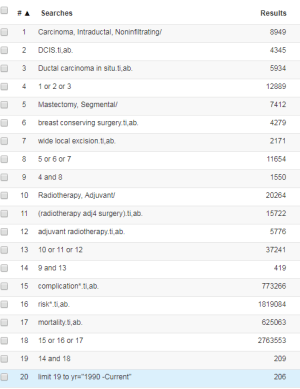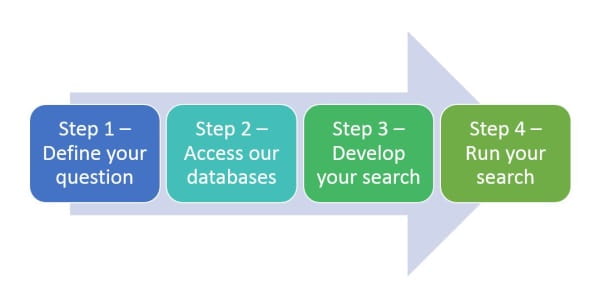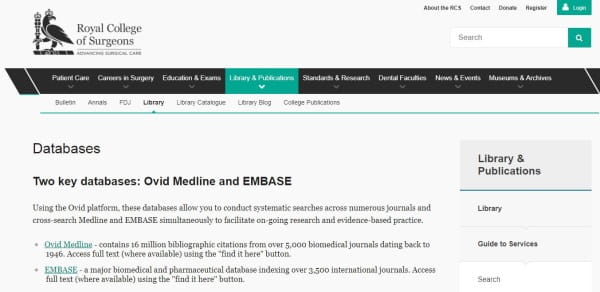Conducting a literature search using RCS Library resources
03 Nov 2017
Kirsty Morrison
A literature search is a systematically thought-out and organised search for all of the research papers published on a particular topic. A well-structured literature search is the most effective and efficient way to locate reliable evidence on a research subject.
Recent searches that Library staff have conducted for RCS Members include:
- “Renal/urinary tract ultrasound use after epididymo-orchitis in children”
- “Back pain/lumbar pain/chronic back pain, investigated either by discography or by CT SPECT”
- “Optical Coherence Tomography imaging of the atherosclerotic carotid artery plaque”
The Library offers this service as a benefit to RCS Members and Fellows, but for those wishing to undertake their own research, this post will offer a starting point with some key hints and tips for getting the most out of the RCS Library resources.
Step 1: Define your question
There are many ways to refine your study question. We tend to use the PICO (or PICOT) method, which works well for clinical questions. You may recognise it from the sections on the request form that you will find on our literature search page. PICO(T) stands for Population, Intervention, Comparison, Outcome, Time: all important areas to consider when defining your topic of study.
Step 2: Access our databases
- Go to the RCS website and use your College login
- Go to the Databases webpage - you can also search the College website for ‘databases’
- Click ‘Ovid Medline’ to go to the Ovid website
- Click ‘Continue’ on the first page that appears (this page contains news and updates for regular users)
- Choose the database you want to search from the list
We recommend conducting your search on both Medline and EMBASE; however, we would do these searches separately because the databases use distinct thesauri and sometimes the search terms do not translate.
Step 3: Develop your search
We encourage you to use the Advanced Search options on our databases to find the most relevant content. In order to use Advanced Search effectively, you need to understand the tools available to you and develop your search strategy accordingly.
Subject headings
Databases such as Medline and EMBASE use a controlled vocabulary, so you will need to establish the correct subject headings for your research question.
Medline uses MeSH (Medical Subject Headings): you can use the online MeSH Browser to scope your subject headings.
EMBASE uses Emtree, which doesn’t have a stand alone browser, but you can use the database itself to search through Emtree and its hierarchies.
Advanced search functions
Keywords describe subject areas; a good set of keywords will help to minimise the number of irrelevant returns. Keyword searching can be particularly useful when combined with truncation and other useful advanced search functions.
Limits
Limits can also be useful to narrow and focus your results. For example, you can limit your keywords to title only, or title and abstract, which should ensure results are more relevant to your research question. You can also use limits to set particular publication dates or languages.
To see the full list of limits, go to the database and click ‘Search Fields’, which will be located above the search box. More filters will appear on the left-hand side of your results once you have completed a search.
When developing your strategy think about the subject headings and keywords you’ll need to use and how the different concepts within your search work together. If you plan this effectively before you begin searching it will help make the process a lot smoother.
Step 4: Run your search

If you would like to conduct your own search, have a look at our in-depth literature search training guide, our SurgiCat+ help pages describing the Ovid search tools, or book an appointment with our trained Information Specialists by emailing library@rcseng.ac.uk.
Kirsty Morrison, Information Specialist


